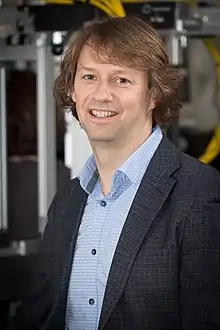Stephen H. Scott
Stephen Harold Scott (born 5 July 1964) is a Canadian neuroscientist and engineer who has made significant contributions to the field of sensorimotor neuroscience and the methods of assessing neurological function.[1] He is a professor in both the Department of Biomedical and Molecular Sciences and the Department of Medicine at Queen's University. In 2013, he was named the GlaxoSmithKline-Canadian Institutes of Health Research (GSK-CIHR) Chair in Neurosciences at Queen's. [2] He is the Co-Founder and Chief Scientific Officer of Kinarm (also BKIN Technologies), the technology transfer company that commercializes and manufactures his invention the Kinarm.[3]
Stephen Scott | |
|---|---|
 | |
| Born | 5 July 1964 Grimsby, Ontario, Canada |
| Nationality | Canadian |
| Alma mater |
|
| Spouse(s) | Anne Vivian-Scott |
| Scientific career | |
| Fields | |
| Institutions | |
| Website | LIMB Lab Website |
Education
Scott received his Bachelor's of Applied Science in Systems Design Engineering from the University of Waterloo in 1988. He went on to complete his Masters of Applied Science in Systems Design Engineering at the University of Waterloo in 1989, and then completed his PhD in Physiology at Queen's University in 1993.
Career
Scott pursued his scientific career as a post-doctoral fellow(1993-1995) and then as a chercheur adjoint(1995-1997) at the Université de Montréal. He joined the Department of Biomedical and Molecular Sciences at Queen's University in 1997.
During his time at Queen's University, he developed the KINARM, a robotic device that objectively and quantitatively assesses the sensorimotor and cognitive impairments associated with a range of damages and diseases.[4] The KINARM is now being sold worldwide for both basic and clinical research purposes.
His current research focuses on the use of optimal control principles during voluntary motor actions, as well as collaborating with clinical researchers to understand how robotics can improve our assessment of brain function.
Awards and honours
Scott was the 2012 recipient of the Barbara Turnbull Award, which recognizes outstanding research into spinal cord injury in Canada.[5] He also received the Mihran and Mary Basmajian Award in 2002 for his research into the adaptive learning of the limbs.[6]
References
- Rhamey, Ashley (August 13, 2017). "Robots and research". Kingston Whig-Standard. Kingston. Retrieved May 23, 2019.
- "Queen's University's Dr. Stephen Scott receives a new research chair and Turnbull Award | NeuroDevNet". www.neurodevnet.ca. University of British Columbia. January 21, 2013. Retrieved May 22, 2016.
- "About Kinarm". Kinarm. Retrieved July 31, 2019.
- Willson, Andrew (December 4, 2018). "Stephen Scott's robot is changing what we know about the brain". Dean's Blog. Queen's University Faculty of Health Sciences. Retrieved May 23, 2019.
- "Barbara Turnbull Foundation, Award Recipients". Barbara Turnbull Foundation. Retrieved May 22, 2016.
- "Limb movement expert Stephen Scott wins Basmajian Award". Queen's Gazette. 33 (11). June 17, 2002. p. 7.
External links
- Profile on Google Scholar
- Profile on ResearchGate
- Profile on Queen's University Department of Biomedical and Molecular Sciences
- Neurotree